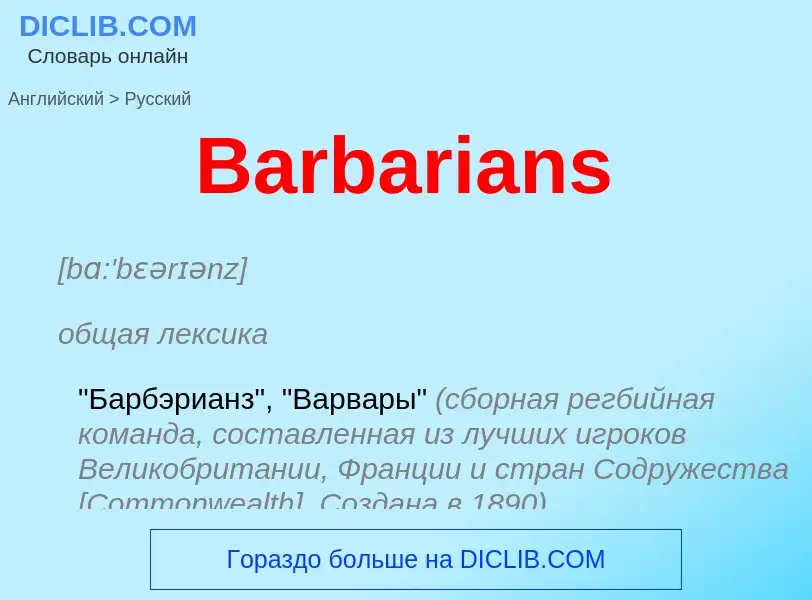Перевод и анализ слов искусственным интеллектом ChatGPT
На этой странице Вы можете получить подробный анализ слова или словосочетания, произведенный с помощью лучшей на сегодняшний день технологии искусственного интеллекта:
- как употребляется слово
- частота употребления
- используется оно чаще в устной или письменной речи
- варианты перевода слова
- примеры употребления (несколько фраз с переводом)
- этимология
Barbarians - перевод на русский
[bɑ:'bɛərɪənz]
общая лексика
"Барбэрианз", "Варвары" (сборная регбийная команда, составленная из лучших игроков Великобритании, Франции и стран Содружества [Commonwealth]. Создана в 1890)
[bɑ:'be(ə)riən]
прилагательное
общая лексика
(Barbarian) [ист.] варварский
относящийся к варварам
варварский
дикий
грубый
(Barbarian) берберский
[уст.] берберийский
устаревшее выражение
чужестранный
существительное
[bɑ:'be(ə)riən]
общая лексика
(Barbarian) [ист.] варвар
неуч
невежда
дикарь
(Barbarian) берберец
[уст.] бербериец
варвар
библейское выражение
чужестранец
пришелец
синоним
Определение
Википедия

A barbarian, or savage, is someone who is perceived to be either uncivilized or primitive. The designation is usually applied as a generalization based on a popular stereotype; barbarians can be members of any nation judged by some to be less civilized or orderly (such as a tribal society) but may also be part of a certain "primitive" cultural group (such as nomads) or social class (such as bandits) both within and outside one's own nation. Alternatively, they may instead be admired and romanticised as noble savages. In idiomatic or figurative usage, a "barbarian" may also be an individual reference to a brutal, cruel, warlike, and insensitive person.
The term originates from the Greek: βάρβαρος (barbaros pl. βάρβαροι barbaroi). In Ancient Greece, the Greeks used the term not only towards those who did not speak Greek and follow classical Greek customs, but also towards Greek populations on the fringe of the Greek world with peculiar dialects. In Ancient Rome, the Romans adapted and used the term towards tribal non-Romans such as the Berbers, Germanics, Celts, Iberians, Thracians, Illyrians, and Sarmatians. In the early modern period and sometimes later, the Byzantine Greeks used it for the Turks in a clearly pejorative manner. In Ancient China, references to barbarians go back as far as the Shang Dynasty and the Spring and Autumn Annals. "Lands beyond moral influence" (Chinese: 化外之地; pinyin: Huà wài zhī dì) or areas outside of range of the Emperor were generally labeled as "Barbarians" or uncivilized through the lens of Sinocentrism.



![The ''Dying Galatian'', [[Capitoline Museums]], Rome The ''Dying Galatian'', [[Capitoline Museums]], Rome](https://commons.wikimedia.org/wiki/Special:FilePath/Dying gaul.jpg?width=200)
![Germanic]] warriors" as depicted in [[Philipp Clüver]]'s ''Germania Antiqua'' (1616) Germanic]] warriors" as depicted in [[Philipp Clüver]]'s ''Germania Antiqua'' (1616)](https://commons.wikimedia.org/wiki/Special:FilePath/Germaniae antiquae libri tres, Plate 17, Clüver.jpg?width=200)
![atlas]] on a 16th-century [[villa]] in [[Milan]]. Sculpted by [[Antonio Abbondio]] for [[Leone Leoni]] atlas]] on a 16th-century [[villa]] in [[Milan]]. Sculpted by [[Antonio Abbondio]] for [[Leone Leoni]]](https://commons.wikimedia.org/wiki/Special:FilePath/IMG 7039 - Milano - Casa degli omenoni - Sarmata - Foto Giovanni Dall'Orto - 8-Mar-2007 crop.jpg?width=200)
![Routes taken by barbarian invaders during the [[Migration Period]], 5th century AD Routes taken by barbarian invaders during the [[Migration Period]], 5th century AD](https://commons.wikimedia.org/wiki/Special:FilePath/Invasions of the Roman Empire 1.png?width=200)

![Miao]] in Hunan, 1795 Miao]] in Hunan, 1795](https://commons.wikimedia.org/wiki/Special:FilePath/Raising an army.jpg?width=200)
![Slaves in chains, relief found in Smyrna (present day [[İzmir]], [[Turkey]]), 200 AD Slaves in chains, relief found in Smyrna (present day [[İzmir]], [[Turkey]]), 200 AD](https://commons.wikimedia.org/wiki/Special:FilePath/Roman collared slaves - Ashmolean Museum.jpg?width=200)
